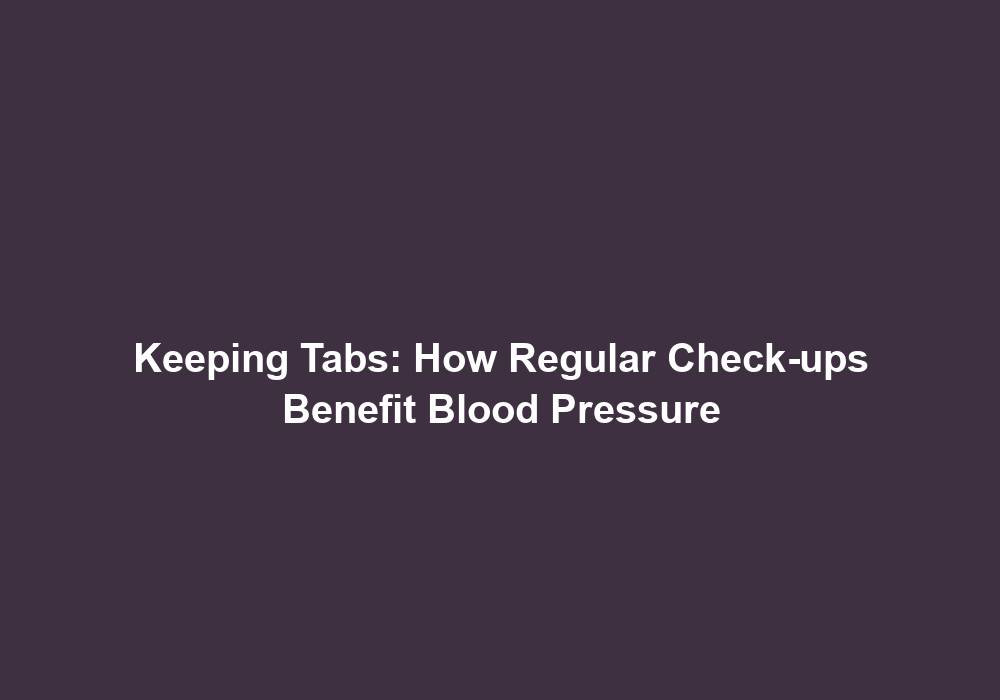Keeping Tabs: How Regular Check-ups Benefit Blood Pressure
Regular check-ups play a crucial role in maintaining good health, and one area that requires special attention is blood pressure. It is essential to monitor blood pressure regularly to prevent and manage various health conditions, such as hypertension or high blood pressure. In this article, we will explore the importance of regular check-ups for blood pressure and how they benefit overall health.
Understanding Blood Pressure
Before delving into the significance of regular check-ups, it is important to understand what blood pressure is and how it is measured. Blood pressure refers to the force exerted by the blood against the walls of the arteries as the heart pumps it around the body. It is measured using two numbers, systolic pressure and diastolic pressure, which are represented as a fraction, such as 120/80 mmHg.
- Systolic pressure: The top number represents the pressure in the arteries when the heart contracts or beats. This measurement indicates the force exerted on the arterial walls during each heartbeat.
- Diastolic pressure: The bottom number represents the pressure in the arteries when the heart is at rest between beats. This measurement indicates the force exerted on the arterial walls when the heart is relaxed.
The Importance of Regular Check-ups
Regular check-ups are vital for monitoring and managing blood pressure effectively. Here are some key reasons why they are beneficial:
Early Detection of Hypertension
Regular check-ups enable healthcare professionals to detect high blood pressure or hypertension early. Hypertension often has no symptoms, making it a silent threat to one’s health. By measuring blood pressure regularly, healthcare providers can identify any deviations from the normal range and take timely action to prevent complications.
Early detection of hypertension allows for prompt intervention, which can significantly reduce the risk of developing serious health conditions such as heart disease, stroke, kidney problems, and vision loss. By identifying high blood pressure early on, healthcare professionals can implement appropriate lifestyle modifications and prescribe medications if necessary, helping individuals maintain optimal blood pressure levels and prevent potential complications.
Prevention of Health Complications
Uncontrolled high blood pressure can lead to severe health complications such as heart disease, stroke, kidney problems, and even vision loss. Regular check-ups ensure that blood pressure is monitored consistently, allowing healthcare professionals to identify any upward trends or sudden spikes. By catching these changes early, appropriate interventions can be implemented to prevent potential complications and maintain good health.
In addition to implementing lifestyle modifications and prescribing medication, healthcare professionals can provide valuable guidance on managing risk factors associated with high blood pressure. They can offer advice on maintaining a healthy diet low in sodium and high in potassium, engaging in regular physical activity, managing stress, and quitting smoking. Regular check-ups provide an opportunity for individuals to receive timely education and support in preventing health complications associated with hypertension.
Personalized Treatment Plans
Each individual’s blood pressure may vary due to factors such as age, genetics, lifestyle choices, and underlying health conditions. Regular check-ups provide an opportunity for healthcare professionals to assess an individual’s blood pressure pattern over time and create personalized treatment plans accordingly. This personalized approach ensures that individuals receive tailored interventions to manage their blood pressure effectively.
A personalized treatment plan may involve a combination of lifestyle modifications and medication. Healthcare professionals can provide detailed guidance on dietary changes, exercise routines, stress management techniques, and medication adherence. By continuously monitoring blood pressure through regular check-ups, healthcare providers can assess the effectiveness of the treatment plan and make necessary adjustments to ensure optimal blood pressure control.
Medication Adjustments and Adherence
For individuals already diagnosed with hypertension and prescribed medication, regular check-ups are crucial for monitoring the effectiveness of the medication. Blood pressure levels can fluctuate, and medication adjustments may be required to achieve optimal control. Additionally, regular check-ups provide an opportunity to address any concerns or challenges regarding medication adherence, ensuring that individuals are taking their prescribed medicines correctly.
During check-ups, healthcare professionals can assess the individual’s response to medication and make appropriate adjustments based on their blood pressure readings. They can also provide education on the importance of medication adherence and address any barriers that may hinder compliance. By actively involving individuals in their treatment plan and addressing potential issues, regular check-ups enhance medication effectiveness and improve overall blood pressure management.
Frequency of Blood Pressure Check-ups
The frequency of blood pressure check-ups may vary depending on an individual’s age, medical history, and risk factors. Typically, it is recommended to have blood pressure checked at least once every two years for individuals with normal blood pressure readings. However, for individuals diagnosed with hypertension or those at high risk, more frequent check-ups may be necessary.
High-Risk Individuals
Certain factors increase the likelihood of developing high blood pressure, making regular check-ups even more critical. High-risk individuals include those with:
- Family history of hypertension or heart disease
- Obesity or overweight
- Sedentary lifestyle
- Unhealthy diet, high in sodium and low in potassium
- Chronic conditions such as diabetes or kidney disease
- Smoking habits
- High stress levels
For high-risk individuals, blood pressure should be checked more frequently, with the frequency determined by their healthcare provider. More frequent check-ups allow healthcare professionals to closely monitor blood pressure levels, identify any changes or trends, and intervene promptly to prevent complications.
At-Home Blood Pressure Monitoring
While regular check-ups with healthcare professionals are essential, at-home blood pressure monitoring can complement the monitoring process. At-home blood pressure monitors are widely available and easy to use, allowing individuals to keep track of their blood pressure between appointments. It is important to choose a validated and accurate device, follow the manufacturer’s instructions, and share the recorded readings with healthcare providers during check-ups.
At-home blood pressure monitoring provides individuals with a convenient way to monitor their blood pressure regularly and become actively involved in their health management. By regularly recording blood pressure readings at home, individuals can track any fluctuations or patterns, providing valuable information to healthcare professionals during check-ups. This collaborative approach enhances the accuracy of blood pressure management and empowers individuals to take an active role in their overall health.
Conclusion
Regular check-ups are essential for monitoring and managing blood pressure effectively. By detecting hypertension early, preventing complications, creating personalized treatment plans, making medication adjustments, and encouraging adherence, regular check-ups play a vital role in maintaining good health. Remember, prevention is always better than cure, and regular check-ups are a proactive step towards preventing and managing high blood pressure for long-term well-being.







